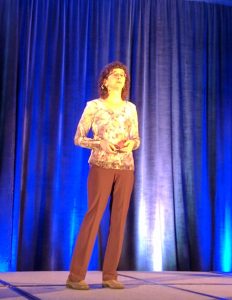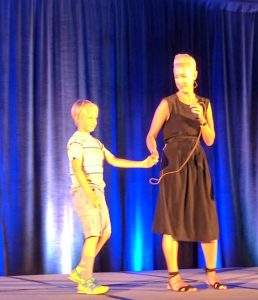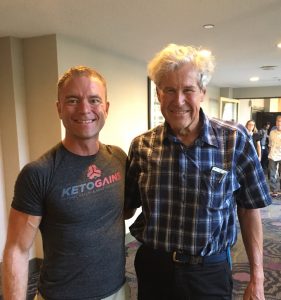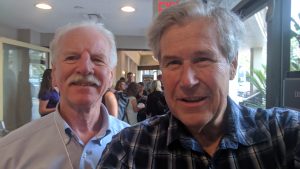Low Carb USA Day 3 Summary – Hallberg, Phinney, Rob Wolf and more
by Paul Mabry MD | Aug 6, 2017 | Uncategorized | 3 comments
3 Comments
Submit a Comment Cancel reply
This site uses Akismet to reduce spam. Learn how your comment data is processed.
 Dr. Sarah Hallberg is a diabetes researcher at the Indiana University Health Center. She started out giving us sobering statistics on the toll diabetes is taking the USA and worldwide. In the U.S. in 2012 14.3% of the population had diabetes, 38% had pre-diabetes and $245 billion was spent on their care as was 1 of every 3 Medicare dollars.
Dr. Sarah Hallberg is a diabetes researcher at the Indiana University Health Center. She started out giving us sobering statistics on the toll diabetes is taking the USA and worldwide. In the U.S. in 2012 14.3% of the population had diabetes, 38% had pre-diabetes and $245 billion was spent on their care as was 1 of every 3 Medicare dollars. The next speaker was Miriam Kalamian a very experienced ketogenic diet coach with a specialty in helping cancer patients during their treatment for their disease. She and the next 3 speakers I will describe have all been influenced by the work of Dr. Thomas Seyfried who has written extensively on cancer as a metabolic disease of mitochondrial dysfunction. So not only are dietary factors addressed but lifestyle elements such as stress, sleep quality, environmental toxins, sunlight exposure and numerous others. Some recommendations that Ms. Kalamian made include eating the last meal at least 3-4 hours before bedtime and keeping good records. She recommends intermittent fasting but has found that women need to eat more often and maintain a longer eating window than men. She recommends giving up alcohol during induction and then no more than 1/2 glass of wine or a single shot of spirits daily after that. She recommends exercise but not during the induction period of ketosis. Some of the things to consider if increased blood sugars are seen include steroids often used cancer patient during chemotherapy and for pain control, thyroid medications and antidepressants which can raise glucose and even high dose Niacin therapy. Also intravenous Vitamin C can read as glucose when checked with a fingerstick glucometer. After people become ketoadapted after about 3 months their fasting blood sugars often rise slightly.
The next speaker was Miriam Kalamian a very experienced ketogenic diet coach with a specialty in helping cancer patients during their treatment for their disease. She and the next 3 speakers I will describe have all been influenced by the work of Dr. Thomas Seyfried who has written extensively on cancer as a metabolic disease of mitochondrial dysfunction. So not only are dietary factors addressed but lifestyle elements such as stress, sleep quality, environmental toxins, sunlight exposure and numerous others. Some recommendations that Ms. Kalamian made include eating the last meal at least 3-4 hours before bedtime and keeping good records. She recommends intermittent fasting but has found that women need to eat more often and maintain a longer eating window than men. She recommends giving up alcohol during induction and then no more than 1/2 glass of wine or a single shot of spirits daily after that. She recommends exercise but not during the induction period of ketosis. Some of the things to consider if increased blood sugars are seen include steroids often used cancer patient during chemotherapy and for pain control, thyroid medications and antidepressants which can raise glucose and even high dose Niacin therapy. Also intravenous Vitamin C can read as glucose when checked with a fingerstick glucometer. After people become ketoadapted after about 3 months their fasting blood sugars often rise slightly. The following speaker was Dr. Nasha Winters a highly articulate Naturopathic doctor specializing in assisting cancer patients with diet and lifestyle modification designed to enhance their medical treatments. She became interested in the field after she was diagnosed with stage 4 ovarian cancer 25 years ago and was inspired by the work of Dr. Seyfried and others. She pointed out that cancer was becoming epidemic and that it had become the leading cause of death in 12 EU countries and was likely to become the leading cause in the US in a few years. She further pointed out that cancer survival had not really improved since the 1950’s and that if you develop cancer the chance of recurrence is 70%. She was passionate in arguing Dr. Seyfried’s idea that cancer is not just a “bad luck” accumulation of a few unfortunate DNA mutations in a cell that transformed it into an unstoppable cancer cell but rather represented deranged mitochondrial function often due to “problems in the terrain of the patient’s life”. These could include epigentics, inflammation, blood glucose, microbiome, circulation/angiogenesis, immune dysfunction, toxic burden, stress response/circadian rhythm, hormone imbalance, and mental/emotional problems.
The following speaker was Dr. Nasha Winters a highly articulate Naturopathic doctor specializing in assisting cancer patients with diet and lifestyle modification designed to enhance their medical treatments. She became interested in the field after she was diagnosed with stage 4 ovarian cancer 25 years ago and was inspired by the work of Dr. Seyfried and others. She pointed out that cancer was becoming epidemic and that it had become the leading cause of death in 12 EU countries and was likely to become the leading cause in the US in a few years. She further pointed out that cancer survival had not really improved since the 1950’s and that if you develop cancer the chance of recurrence is 70%. She was passionate in arguing Dr. Seyfried’s idea that cancer is not just a “bad luck” accumulation of a few unfortunate DNA mutations in a cell that transformed it into an unstoppable cancer cell but rather represented deranged mitochondrial function often due to “problems in the terrain of the patient’s life”. These could include epigentics, inflammation, blood glucose, microbiome, circulation/angiogenesis, immune dysfunction, toxic burden, stress response/circadian rhythm, hormone imbalance, and mental/emotional problems. Alison Gannett was the next speaker. She was a world class extreme skier and mountain biker winning numerous competitions until she was diagnosed with a malignant brain tumor in 2013 and given 1 year to live. She received conventional treatment but also applied the principals espoused by the previous 2 speakers and improved dramatically. She is now stable and has been trained by Dr. Winters to help others fight cancer with a ketogenic diet and lifestyle modification. She recommends having a DNA test for numerous metabolic markers. One thing in her presentation that I found memorable was when discussing how bad stress could be in causing cancer recurrence she said: “Just because you love your job doesn’t mean your job is not killing you.” She leads a much more laid back lifestyle now and misses her competitive skiing and biking some but is very happy that though she was supposed to be dead 3 years and 2 months ago she has never felt better in her life.
Alison Gannett was the next speaker. She was a world class extreme skier and mountain biker winning numerous competitions until she was diagnosed with a malignant brain tumor in 2013 and given 1 year to live. She received conventional treatment but also applied the principals espoused by the previous 2 speakers and improved dramatically. She is now stable and has been trained by Dr. Winters to help others fight cancer with a ketogenic diet and lifestyle modification. She recommends having a DNA test for numerous metabolic markers. One thing in her presentation that I found memorable was when discussing how bad stress could be in causing cancer recurrence she said: “Just because you love your job doesn’t mean your job is not killing you.” She leads a much more laid back lifestyle now and misses her competitive skiing and biking some but is very happy that though she was supposed to be dead 3 years and 2 months ago she has never felt better in her life. The next speaker was equally inspiring. Audra Wilford has a master’s degree in philosophy and education and has trained as chef. She is the mother of 2 and the wife of a UCLA Professor. 6 years ago her son Max was diagnosed with an inoperable brain tumor (Grade III mixed glioma). She found ways of using the ketogenic diet and the Terrain approach to lifestyle discussed earlier to help her oncologist and neurosurgeon who provided conventional treatments. Against all odds Max continues to do well. She was so thankful that in 2015 she founded the MaxLove Foundation to help other parents when their children are diagnosed with cancer and show them how to use a ketogenic diet and lifestyle modification to aid conventional therapy. When Max came on stage there was not a dry in the Auditorium. Thank you Audra for all you have done for Max and the children of America.
The next speaker was equally inspiring. Audra Wilford has a master’s degree in philosophy and education and has trained as chef. She is the mother of 2 and the wife of a UCLA Professor. 6 years ago her son Max was diagnosed with an inoperable brain tumor (Grade III mixed glioma). She found ways of using the ketogenic diet and the Terrain approach to lifestyle discussed earlier to help her oncologist and neurosurgeon who provided conventional treatments. Against all odds Max continues to do well. She was so thankful that in 2015 she founded the MaxLove Foundation to help other parents when their children are diagnosed with cancer and show them how to use a ketogenic diet and lifestyle modification to aid conventional therapy. When Max came on stage there was not a dry in the Auditorium. Thank you Audra for all you have done for Max and the children of America. Rob Wolf is a former research biochemist who has done extensive research in ancestral and evolutionary ways of eating. He has also done research on ketogenic diets. In his talk today he focused on Traumatic Brain Injury (TBI). He has done work with the Navy SEALs on this issue. He described what happens after one of the 2 types of TBIs the direct blow and the acceleration-deceleration injury. There is ischemia followed by re-perfusion. This leads to loss of membrane polarity which can cause cerebral edema. Cerebral edema can cause terminal membrane depolarization with excitatory neurotransmitter release, free radical release and cell death (apoptosis). He points out there were 2.5 million ER visits for TBI in 2010 and the number of visits have risen by 50% in the last 20 years in children. Some of the things that can result from a TBI include sleep disturbance, cognitive impairment, dementia, mood alterations, hypogonadism and other hormonal abnormalities. He points to a study done in Japan 20 years ago using Ringer’s solution with ketones for car wreck victims with head injuries that showed decreased disability resulting in the ketone treated patients to suggest that ketosis and possible exogenously administered ketones might well be helpful. He would love to see youth sports players give ketone containing drinks rather than “Gatorade” after head injuries. One very interesting point he made during Q&A was that betahydroxybutarate is the signaling molecule that Brain Derived Neurotrophic Factor (BDNF) to be released and activated and it is required for the growth and repair of brain neurons and this might be another way ketosis could help in the setting of TBI.
Rob Wolf is a former research biochemist who has done extensive research in ancestral and evolutionary ways of eating. He has also done research on ketogenic diets. In his talk today he focused on Traumatic Brain Injury (TBI). He has done work with the Navy SEALs on this issue. He described what happens after one of the 2 types of TBIs the direct blow and the acceleration-deceleration injury. There is ischemia followed by re-perfusion. This leads to loss of membrane polarity which can cause cerebral edema. Cerebral edema can cause terminal membrane depolarization with excitatory neurotransmitter release, free radical release and cell death (apoptosis). He points out there were 2.5 million ER visits for TBI in 2010 and the number of visits have risen by 50% in the last 20 years in children. Some of the things that can result from a TBI include sleep disturbance, cognitive impairment, dementia, mood alterations, hypogonadism and other hormonal abnormalities. He points to a study done in Japan 20 years ago using Ringer’s solution with ketones for car wreck victims with head injuries that showed decreased disability resulting in the ketone treated patients to suggest that ketosis and possible exogenously administered ketones might well be helpful. He would love to see youth sports players give ketone containing drinks rather than “Gatorade” after head injuries. One very interesting point he made during Q&A was that betahydroxybutarate is the signaling molecule that Brain Derived Neurotrophic Factor (BDNF) to be released and activated and it is required for the growth and repair of brain neurons and this might be another way ketosis could help in the setting of TBI. In 2011 I decided to give the Atkins Diet a try as nothing else had worked for my chronic obesity in my 61 years of trying. I went down and bought “The New Atkins for a New You”. That book was co-authored by our next speaker Dr. Stephen Phinney. Now 5 years later I have reached my goal weight not seen since high school and maintained it for a year. Thank you Drs. Phinney and Westman and so many other doctors and scientists who have struggled to get the low carb, high fat message out. Today Dr. Phinney spoke about Nutritional Ketosis, a term he coined 37 years ago. At that time pretty much all doctors thought ketones were a bad thing only seen in diabetes or starvation.
In 2011 I decided to give the Atkins Diet a try as nothing else had worked for my chronic obesity in my 61 years of trying. I went down and bought “The New Atkins for a New You”. That book was co-authored by our next speaker Dr. Stephen Phinney. Now 5 years later I have reached my goal weight not seen since high school and maintained it for a year. Thank you Drs. Phinney and Westman and so many other doctors and scientists who have struggled to get the low carb, high fat message out. Today Dr. Phinney spoke about Nutritional Ketosis, a term he coined 37 years ago. At that time pretty much all doctors thought ketones were a bad thing only seen in diabetes or starvation.
It is just so difficult to imagine you as a “fat doctor” as I look at you now! Almost funny.
This is really an incredible precis of these speakers. Thank you.
The item at the end of your report on Miriam Kalamian’s presentation caught my eye. That is: After about 3 months of ketoadaptation, a person’s fasting BG may rise slightly. That seems to be the case for myself, (from mid 90’s to about an average of 105, but never over 115.) Two months ago my HbA1C was 5.3. I would like more information about this keto induced rise in BG if possible. Is that rise considered harmful? Is it temporary? Does it have a negative impact on HbA1C?
Thanks in advance for your thoughts on this or perhaps pointing me to other references about this.
There are a lot of reasons that the first morning blood sugar is usually the highest of the day that are not all bad. One is that we all have a normal cortisol surge in the morning and cortisol release increases glucose levels. In people who are insulin resistant and or have fatty liver, the glucose that is released in response to the gloconeogenesis (making sugar from protein) and glycolysis (breaking glucose stored as glycogen in the liver to glucose and dumping it into the blood stream) do not shut down leading to high morning sugars. I mentioned her take on high morning sugars only because I had never heard it before and thought others might not have heard it either. I don’t have a source but I’m looking at her slide that shows this. Unfortunately she did not cite a reference (it’s slide 11 of 45). Here’s a link to her web site and she has a contact form. You could ask her. http://www.dietarytherapies.com/